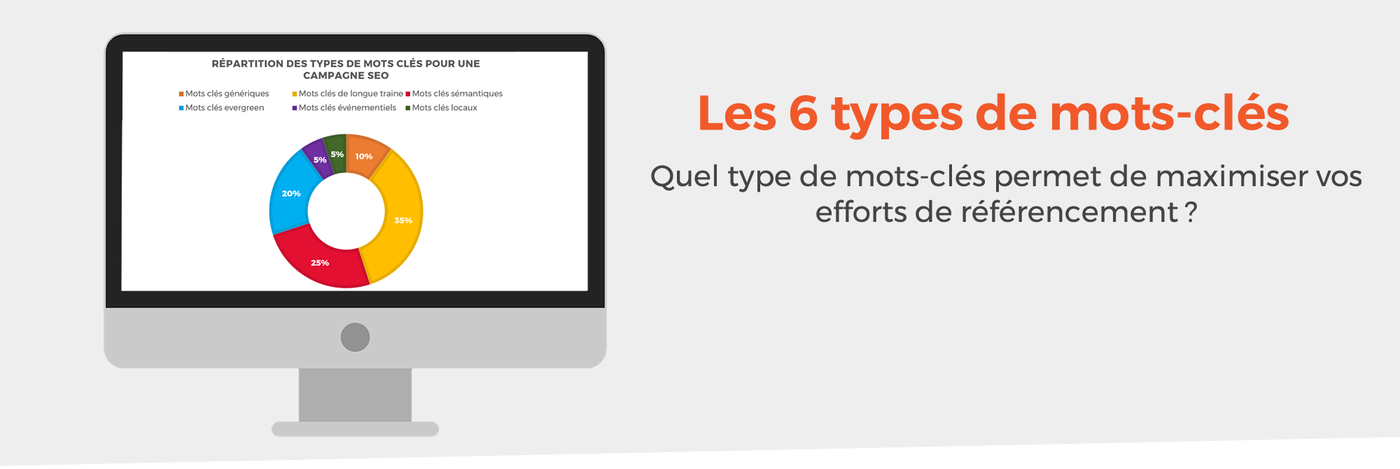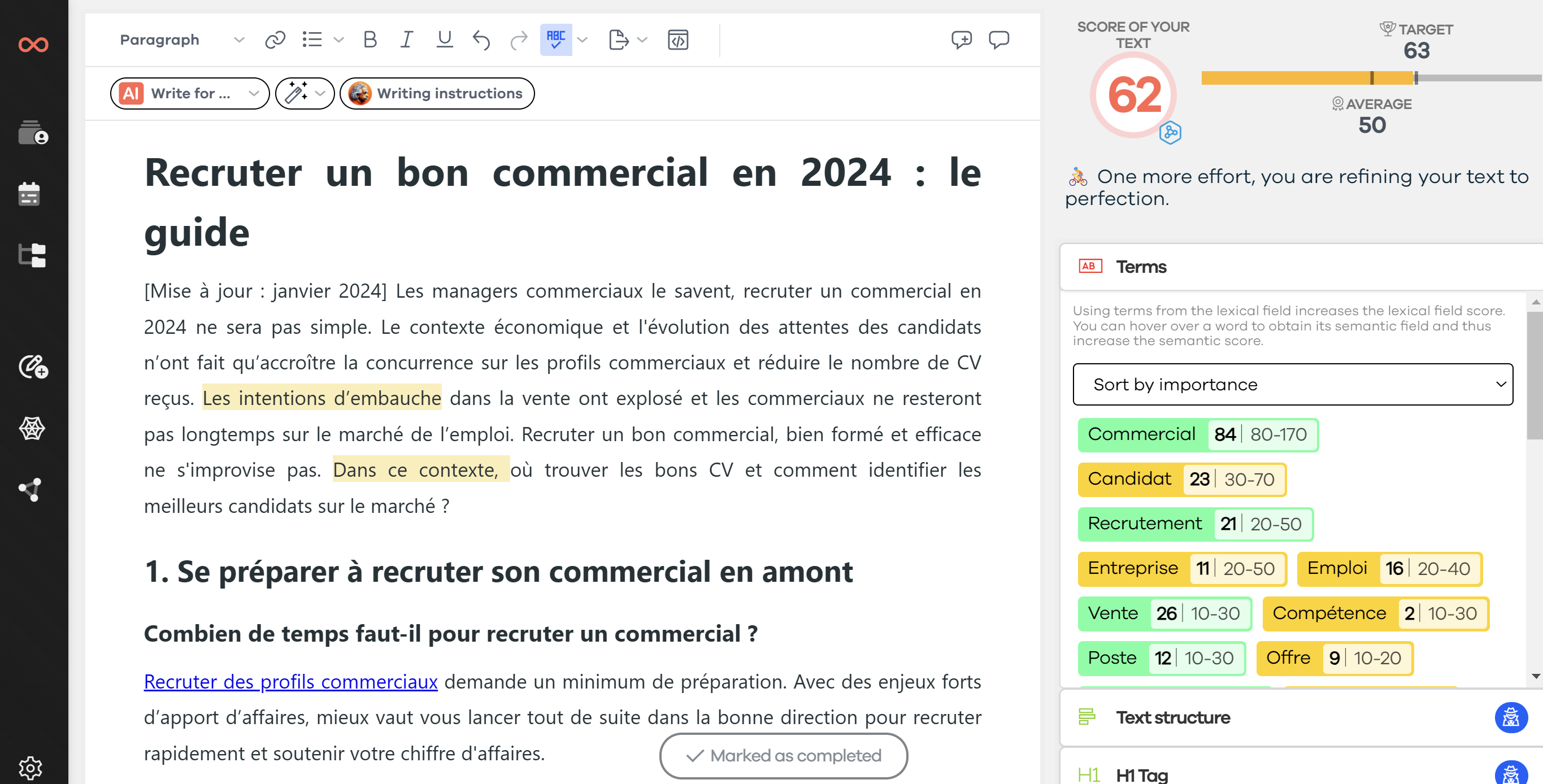Choosing your keywords is the first step to successful SEO. And successful SEO leads to an increase in organic visits. More visits mean more potential customers, more conversions, and more earnings.
There is a lot of information available on this topic, including our complete guide to keyword research. What matters most is knowing what type of keywords to select. This article is a supplement to the post choosing your SEO keywords, it will help you select the right keywords based on your strategy.
What type of keywords maximize your SEO efforts?
It's important to use different keywords for each target audience and for each stage. This way, you will reach a wider audience and increase your chances of making a sale.
Before we get into the heart of the matter, do you know how many types of keywords there are?
I will introduce you to 6 types of keywords that you absolutely need to know. We will start with the most common ones such as long-tail keywords and then move on to the more technical ones like semantic keywords.
Here is the distribution by keyword type that I recommend during your SEO campaigns. Of course, the distribution varies according to the profile and objectives of your client.
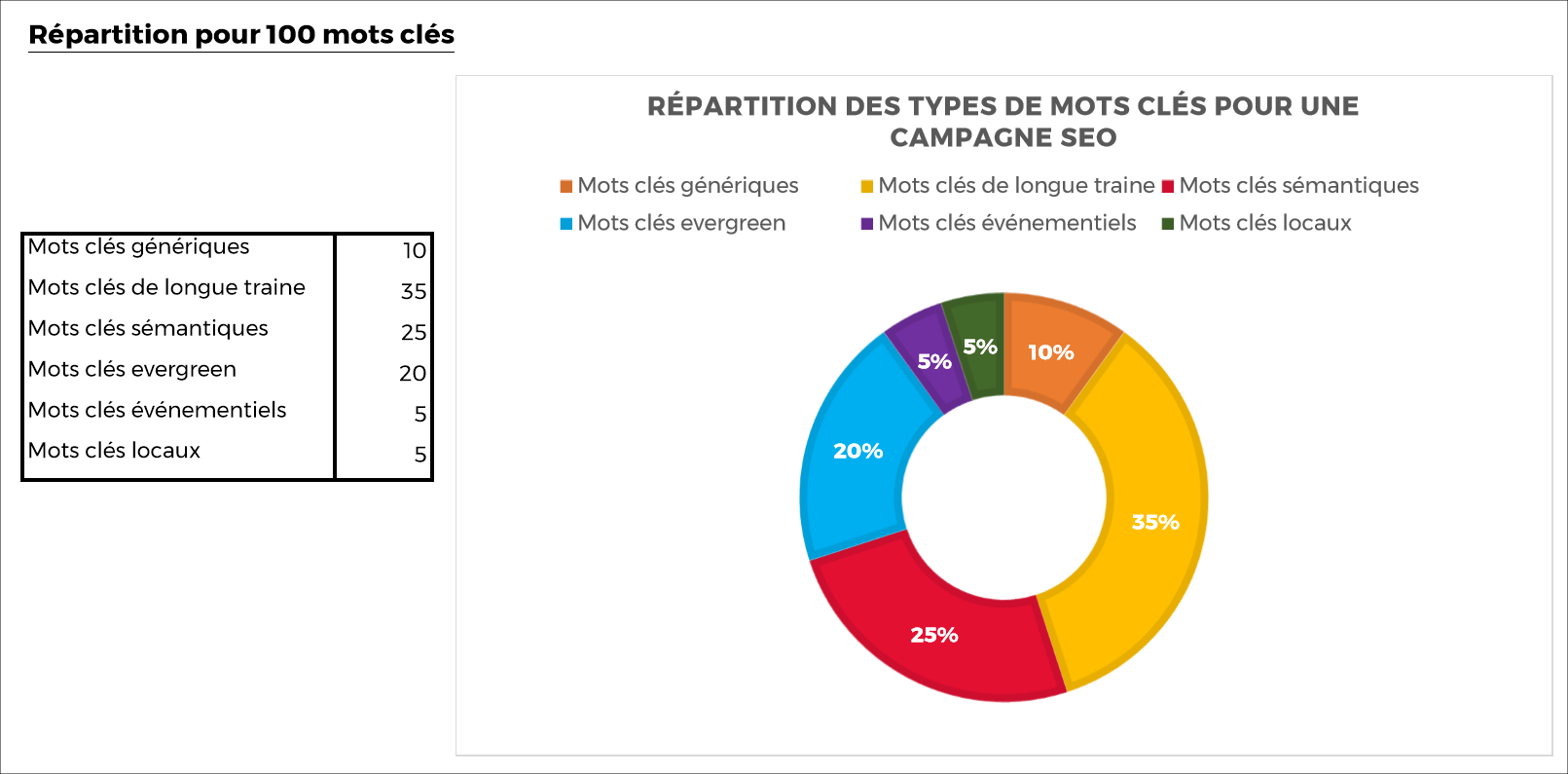
1. The head of the long tail
These keywords are short as they consist of a maximum of three words. They are also called generic keywords.
They have a high volume and competition.
Internet users use generic keywords at the beginning of their searches.
That's why it's very difficult to pinpoint the search intent of this type of keyword. They lack precision.
Take the example of a person who types the keyword "highway code". They may be looking for information on driving rules or on tests/courses.
The head of the long tail has a low conversion rate, as it is difficult to pinpoint the search intent of the user.
- high search volume
- significant competition
- broad search intent
- low conversion rate
Note: For those who know me, I do not recommend SEO actions on this type of keyword. Use when the theme constantly appears throughout your website.
2. The long tail
Long-tail keywords consist of more than 3 words. They are rather specific and have a lower search volume than head keywords. They are sometimes associated with "niche keywords".
Their main advantage is that the competition is less high.
Moreover, you can easily identify the search intent.
So, when a user uses the phrase "download complete highway code 2018", they are looking for websites that offer this document. In this case, all you need to do is display a download button for a PDF and/or possibly the cost of purchasing the product.
Even better, users who use this type of keyword are generally ready to buy. To learn more, visit the article dedicated to long tail in natural referencing.
- low search volume
- low competition
- specific search intent
- high conversion rate
Note: To be used on blog posts and product pages.
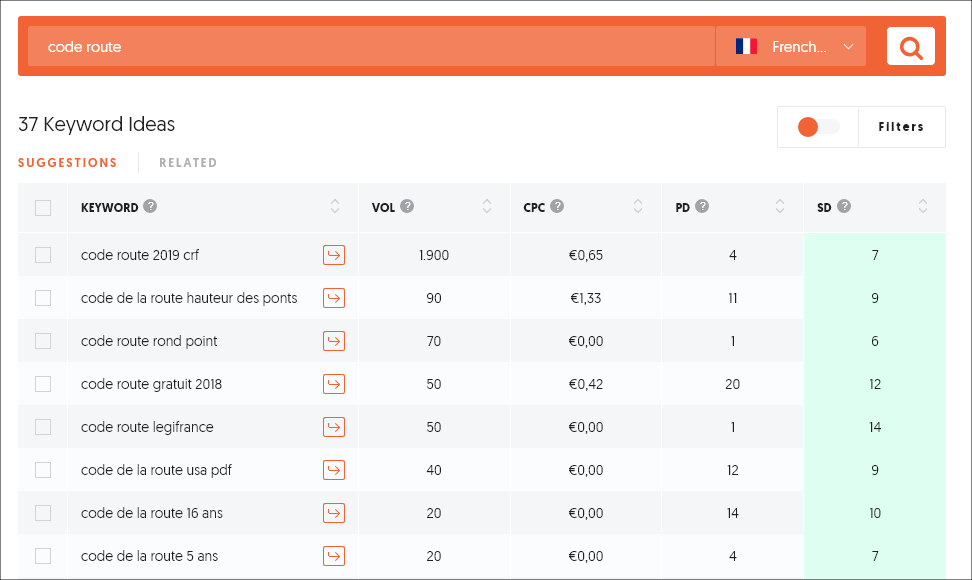
Ubersuggest allows you to discover new long-tail keywords with low competition.
3. Semantic keywords
Wordprint keywords or semantic keywords are keywords closely related to your main keyword.
So, if your main keyword is "social protection", your wordprint words could be contribution, regime, benefit, etc.
To get a semantic word, you first need to choose a main keyword.
These words are useful because they allow you to match a broad theme while targeting all subcategories, all from a single word.
This type of keyword works wonderfully when used in publications and blog posts.
However, they are sometimes difficult to identify and can bring traffic (especially for voice search).
The SEOQuantum tool is another excellent way to get a list of words. It's very easy: just type your main keyword.
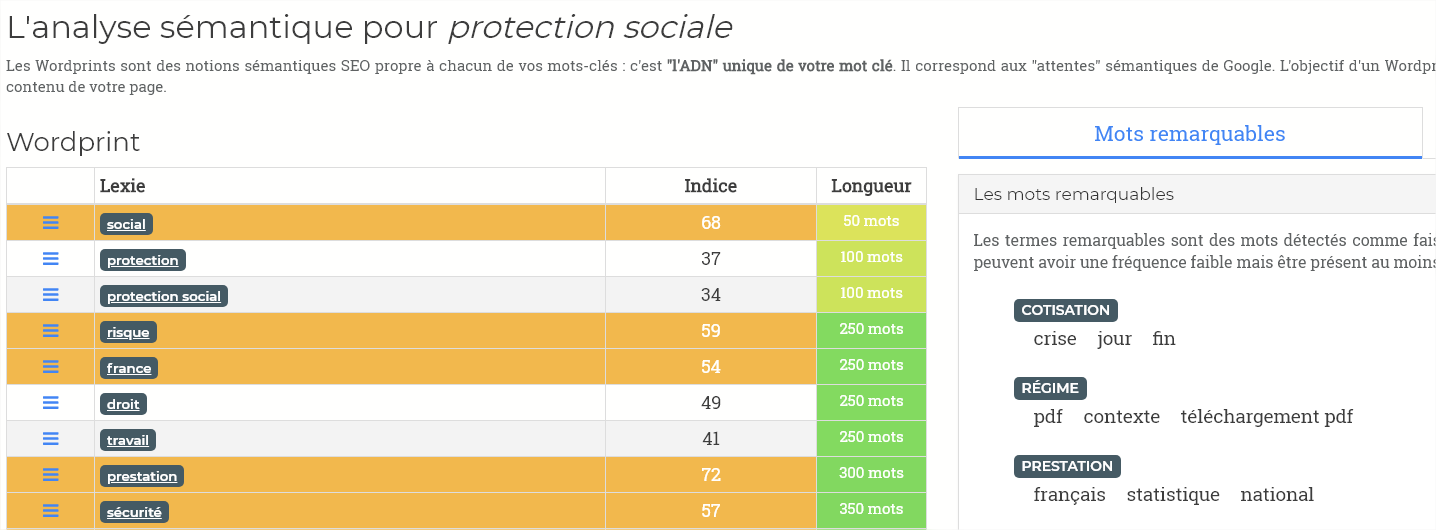
- low search volume
- low competition
- specific search intent
- high conversion rate
Note: It helps to increase the SEO factors on the main keyword and aids in content creation.
4. Event keywords
Event keywords are news-related and correspond to something recent.
News are short-term keywords. Let's take "Yellow Vest" as an example.
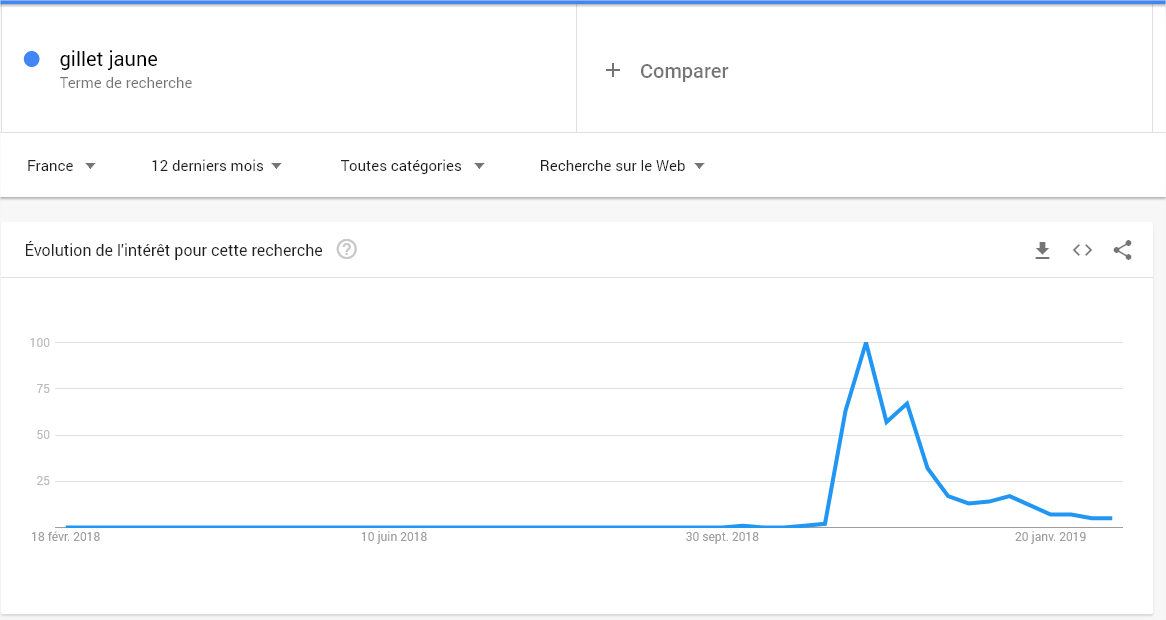
As you can see, the search volume reached its highest level at the end of November at the beginning of the movement and dropped sharply afterwards.
You can take advantage of this high search volume to get more organic visits. However, be prepared for a severe drop once the media wave has passed.
This type of keyword allows you to join a trend and attract a new audience.
- exponential search volume
- medium competition
- specific search intent
- high conversion rate
Note: it allows you to create content that is in tune with the times.
5. Evergreen keywords
Here, it's the opposite concept of the event keyword. The English expression "EVERGREEN" means a keyword that is imperishable or persistent over time.
Evergreen keywords remain relevant at all times. The search volume varies little.
The advantage is that you are sure that your content will always be in demand several years later.
It is therefore important to update this type of content. Make sure it ages well (update your old content).
The number of views may not be extraordinary, but it will remain constant. Time will be your ally. It will bring you a significant number of views.
Evergreen keywords often come with informative and educational content (informational content).
Well-designed instructional content can increase domain authority.
The more informational content there is, the higher your score. This means better SEO. Being visible allows you to increase your number of visits and retain your readers.
- medium search volume
- medium competition
- specific search intent
- high conversion rate
Note: To be used for informative content that can be regularly updated or that will age well.

The keyword "Instagram" is a good example. It has a homogeneous search volume.
6. "Local" keywords
You can target a specific neighborhood, city, department, or even a country.
This is particularly useful for small local businesses whose clientele is primarily local.
Here's how to find a keyword corresponding to a geographic area. Good news, this is the easiest type of keyword to identify. Choose the target area of the business as the keyword.
You have probably already displayed your address on your website. I advise you to use it in your content. It can make a difference.
- low search volume
- low competition
- specific search intent
- high conversion rate
Note: very important for local businesses.
Search intent to categorize keywords
Another way to categorize keywords is by the type of search intent of the user. This method allows you to have a vision on the conversion rate. When a user makes a query, their intent falls into one of these 3 categories:
Need for information
Users want to get general information about a specific item or topic. They use keywords starting with "what are the benefits of", "how", "guide on", etc. These keywords tend to appear in informational content aimed at raising reader awareness. You can also use a journalism technique, the 5W1H (Who What Where When Why How) when writing this type of informational content.
Need for a product or service
These users are looking for a product or service to buy or consult. Here, use keywords related to product specifications, its expiration date, its place of origin, its shipping costs, etc. to provide clear and specific information.
Purchase motivation
This is the last step before placing an order. At this stage, users compare different products and try to get a good deal. Use keywords like: best price, sale, best quality, satisfaction guaranteed, easy refund, etc. The idea is to build their confidence so that they buy your product.
To learn more, we have dedicated two posts to this topic:
It's your turn
There are 6 types of keywords: each type of keyword has its strengths and weaknesses. They allow you to optimize your natural SEO and should be used in different situations. Now that you know how to use them, it's time to apply them to your strategies and choose your keywords well based on the 6 types.
Need to go further?
If you need to delve deeper into the topic, the editorial team recommends the following 5 contents:
